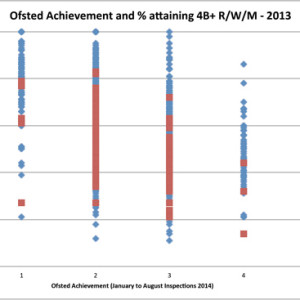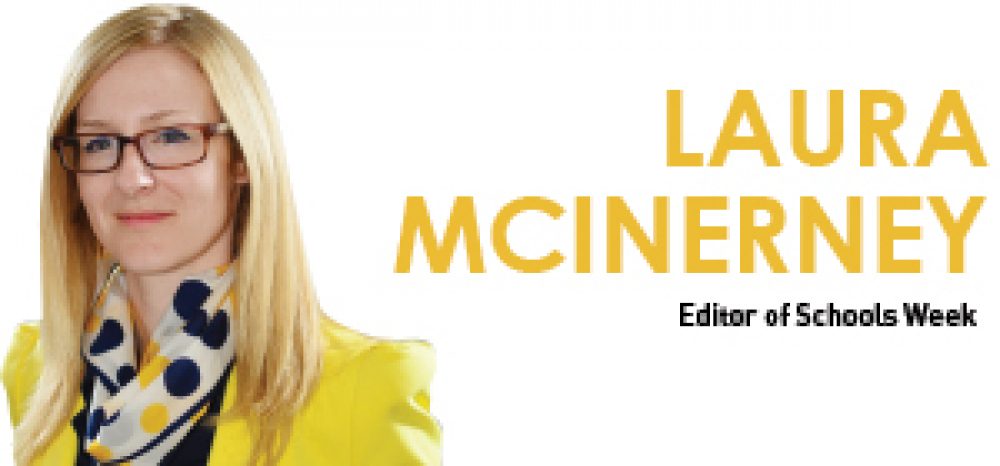So, what does the government’s new ‘coasting schools’ plan actually involve?
Things we know:
– As soon as a school is identified as ‘failing’ the Regional School Commissioner will intervene immediately.
– If the school does not have a ‘credible plan or capacity’ for turnaround then the government will make more moves.
– Headteachers, and other senior managers, will be sacked if necessary.
– Squads of ‘super heads’ will be sent to the school in order to turn it around.
– Maintained schools will be encouraged (possibly forced) to become academies. Those who are already academies will have their academy sponsor switched.
How is this different to now?
Much of it isn’t.
At present, if a maintained school is rated as inadequate it receives a letter within 5 days from the Department for Education to encourage takeover. If the local authority doesn’t do it, the DfE gets involved anyway. In academies, the RSC does likewise.
The big shift is that this won’t just happen for schools labelled as inadequate but also for schools rated as ‘requires improvement’ (or ‘satisfactory’, as it used to be known).
Intervening in ‘requires improvement’ schools is a strange (and slightly worrying) shift
Schools rated as ‘requires improvement’ are often not that different on achievement to ones rated as ‘good’.
Back in February, we used government data to create graphics starkly showing this fact, and warning of the many ‘false positives’ that will see heads fired even though their school is really no different to a ‘good’ one.
There are other serious questions to ask, too.
1. Where will the super heads come from?
There is a dearth of good headteachers. That’s partly why schools struggle to get good ones in the first place. Upping the ‘football manager approach’ to head-dom, where you get instantly fired over mistakes, isn’t going to make the role more attractive, and I’m not hearing any great plans for how we’re finding or grooming new ones.
2. Given there are so many ‘get-out’ clauses to these interventions, will decisions be transparent?
While some schools are academised quicker than anyone can get a protest group together, others are allowed to limp on in inadequacy. IES Breckland – a free-school managed by a for-profit provider – has been inadequate for over a year. It hasn’t been removed from its sponsor. Why? We don’t know. Almost everything about the process of selecting and monitoring academy sponsors is hidden from view.
With the stakes upped, accusations of ‘politics’ – of Ofsted being sent in to force academisation on one school while another is let off scot-free – will get worse, and faith in the inspector will collapse completely.
More transparency would help. When there is greater accountability people need more assurance of fairness. More publication of minutes, more public consultations about decisions sound like ‘bureaucracy’ but they are critical in ensuring the takeover isn’t marred with conspiratorial disgruntlement from the off. Transparency would genuinely help. I’m not holding my breath, though.
3. What happens when a school has changed hands twice and is still failing?
We are now reaching this point. Some schools originally sponsored in the early 2000s, later switched sponsors and yet still require improvement. Is the plan to switch them around forever?
There is nothing wrong with challenging failing schools. There is everything wrong with trying to do it on the backs of imaginary people
Ultimately Morgan’s plan is spreading capacity around the system. That’s a good thing. We should want excellent people to be in challenging places and the most successful academy sponsors to take on the toughest schools.
The really big inherent problem is that we aren’t doing much to build that capacity. This whole plan relies on there being excellent headteachers and amazing sponsors. Unless I’m missing something we are just hoping they are going to spring up from somewhere, run open-armed into the zaniest schools, knowing all the while that if they fail they will be unceremoniously dumped because of an Ofsted judgment that could turn on a penny.
There is nothing wrong with challenging failing schools. There is everything wrong with trying to do it on the backs of imaginary people. I said in 2010 that ‘wing and prayer’ is not a great strategy for school improvement. It still applies now.


‘Superheads’ take over more than one school. I know of one who is executive head of 8 schools at the last count. They have absolute autonomy and can become tyrants because nobody dares challenge anything they do. They ‘earn’ upwards of £500K.
Experienced teachers know that if you turn a blind eye to bad behaviour in the classroom, that bad behaviour generally gets worse. In effect, turning a blind eye condones the behaviour. This is how young people learn. They will push at the edges until someone stops them. If no-one stops them they push even harder. Weak teachers find that other students copy the bad behaviour and chaos ensues.
Nicky Morgan is like a naughty student who is copying the bad behaviour of Michael Gove. The Headteacher organisations turned a blind eye to the frankly outrageous behaviour of Mr Gove. By not challenging him they gave the message that it is fine to denigrate teachers and headteachers, to build straw men of under-performance statistics, to push reform so quickly that no-one could keep up with it or have any idea where it was going. Ms Morgan is only copying her mentor.
To anyone outside the classroom, the deafening silence of headteacher organisations must seem as though headteachers are in agreement with all these loony ideas.
For goodness sake, when is someone going to get a grip and say “enough is enough”! Or are the headteacher organisations going to tell us in 5 years time that they knew it was all going to end in tears. (Rather like the current Labour leadership candidates all knew that the strategy they had been selling for 5 years was pathetic all along, but they had kept quiet at the time.)
ASCL and NAHT. Wake up and start leading, before you have no-one left to lead.
A cynic might say IES Breckland is allowed to continue unchanged because Sabres Educational Trust outsourced the day-to-day running of the school via a contract with for-profit IES International English Schools UK Ltd. If the DfE had stepped in and terminated the contract, it would make it harder for the DfE to allow other schools to enter into similar contracts.
In theory, academies and free schools are charities which can’t make a profit. But they can outsource their running to for-profit companies as IES Breckland did. Bad publicity, therefore, is not welcome.
It’s likely that some for-profit firms will also set up charitable ‘vehicles’ by which contracts can be given to the for-profit parent company. A neat way of diverting taxpayers’ money which should be spent on education into the pockets of shareholders.
There’s always a financial cost when academies and free schools change hands. But the Government refuses to say how much. The information is ‘commercially sensitive’, the DfE says. I’ve appealed to the Information Commission and am waiting a decision.
Taxpayers have a right to know especially as academy conversion is the most expensive but least effective of interventions. The National Audit Office found informal interventions such as local support were more effective than academy conversion.